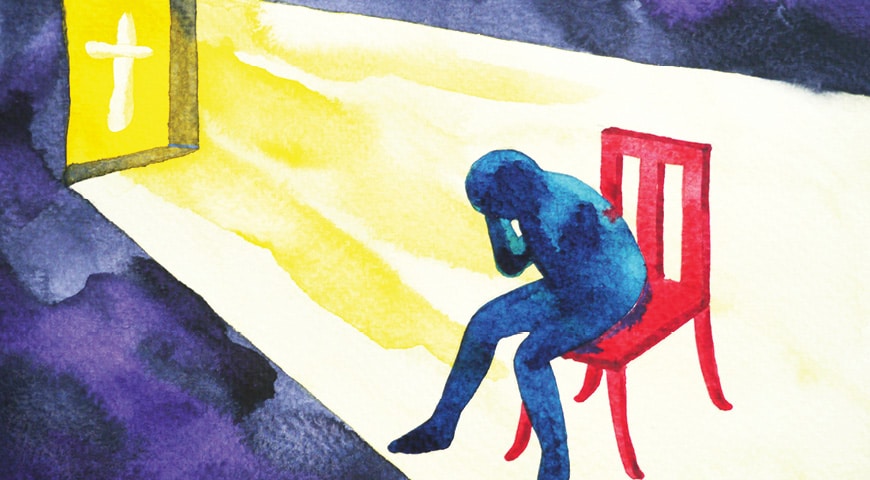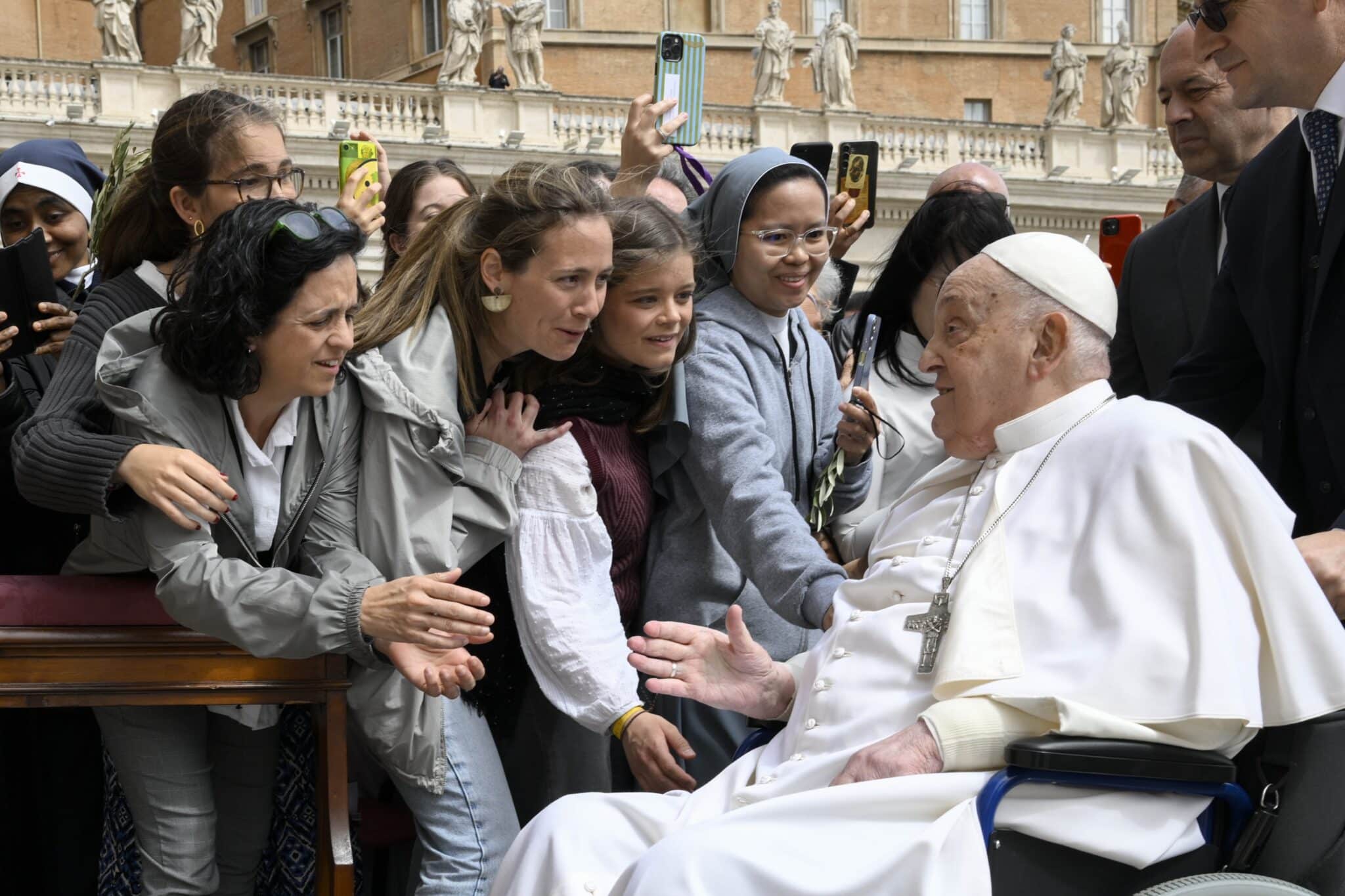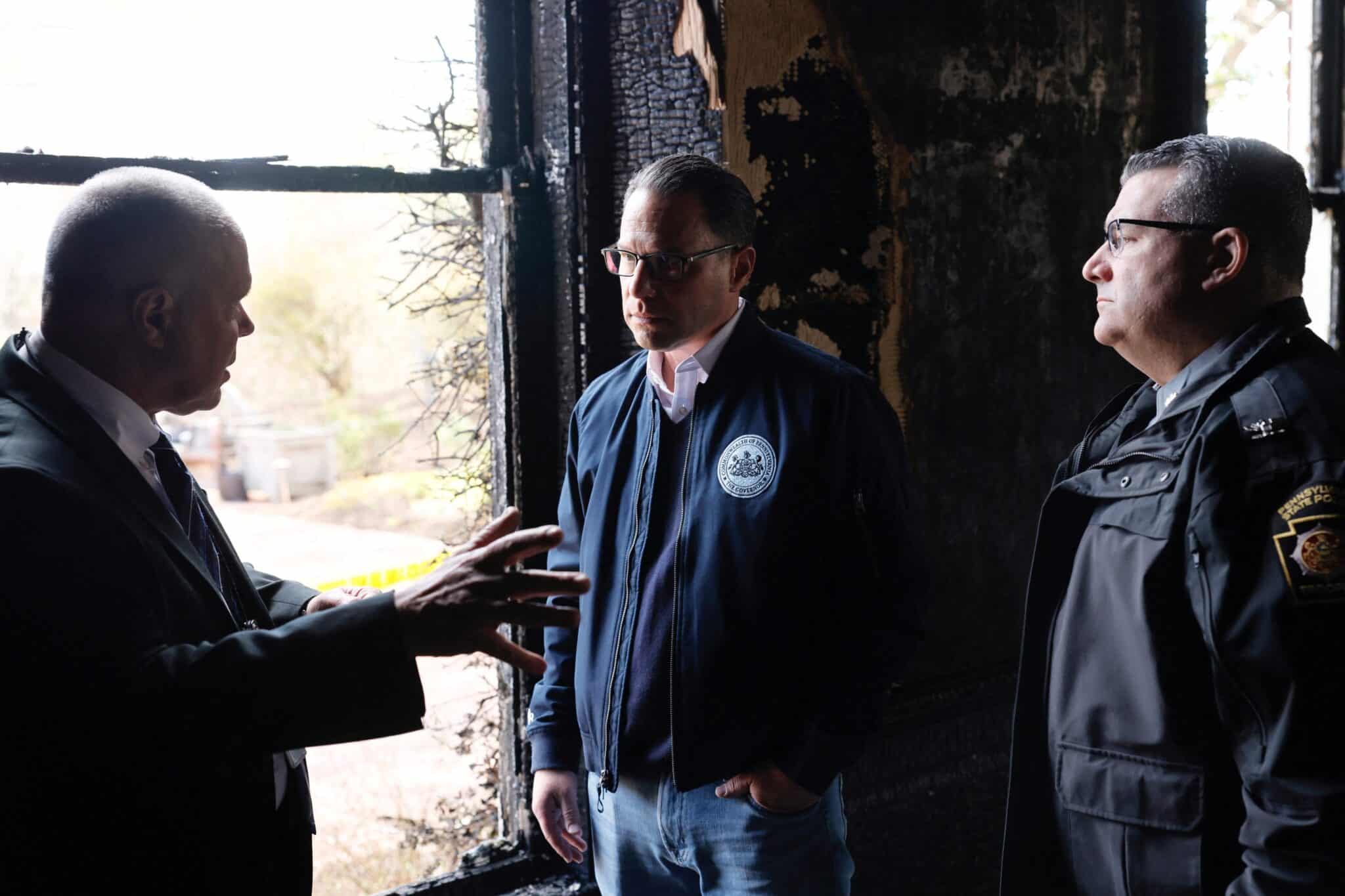Behind the statistics, facts, and figures on our nation’s mental health crisis are human beings—all children of God. How the Church and we, as people of faith, respond can save lives and help get people who are suffering the help they need.
They’re family members, coworkers, friends, and fellow parishioners. In the United States alone, an estimated 40 million Americans suffer from an anxiety disorder, and another 16 million have clinical depression, according to the National Alliance on Mental Illness (NAMI). When the numbers of people with other mental illnesses are added in, the figure represents about 20 percent of the US population. Think of five people you know: One of them is likely dealing with a mental health condition.
The stress of the COVID-19 pandemic has only worsened the collective mental health of our society. Many who were already diagnosed with a condition saw their mental health deteriorate, despite their best efforts to keep a healthy regimen of medication and/or counseling. Many who were previously not struggling with a mental health condition now find themselves facing one, due to the social isolation, mass death, and stress of living in a pandemic.
The direct line between mental illness and suicide cannot be overlooked. One way to view suicide is as the final, fatal symptom of mental illness. For those who suffer from an invisible illness, suicide is, sadly, sometimes the only physical indication that something is wrong. The most recent numbers from the Centers for Disease Control come from 2018: 47,511 deaths by suicide in the United States. On a personal level, two classmates from the Catholic high school I attended, one friend from the Catholic university I went to, and a family friend from a Catholic family all died by suicide in the span of about five years. Each death delivered a shock wave throughout circles of friends and families.
‘Every Priest Must Know Human Psychology’
An invisible plague is in some ways the most terrifying, as it lurks among us as something unspoken, its reality even doubted or vilified. However, both science and faith remind us that there is hope. Now more than ever, the role of the Church to be a welcoming, safe place for those with a mental illness is increasingly important. With lives on the line, it’s crucial for awareness to be raised and educational resources on mental illness shared with Catholic schools and parishes from coast to coast. Moreover, Church leaders are in a unique position to help destigmatize mental health and treatment.
In a 2019 interview with the Argentine newspaper La Nación, Pope Francis opened up about a time in the 1970s when he sought out the help of a psychotherapist. “Being provincial of the Jesuits in the terrible days of the dictatorship, in which I had to take people in hiding to get them out of the country and thus save their lives, I had to handle situations that I did not know how to deal with,” the pope said.
“Throughout those six months, she helped me position myself in terms of a way to handle the fears of that time.” He also pointed out the role of priests in addressing mental health at the parish level. “I’m convinced that every priest must know human psychology,” Pope Francis said. “There are those who know it from the experience of the years, but the study of psychology is necessary for a priest.”
Fortunately, there is a growing trend to bring the power of religious convictions and spirituality into mental health treatment. Across the country, therapists and social workers are finding that the combined approach of faith-infused mental health care is resonating with individuals for whom spirituality is interconnected with their mental well-being. A number of experts in the field agreed to share their stories with St. Anthony Messenger.

Helping Others Carry Their Cross
The good news with regard to the mental health crisis is the rapid increase in resources and acceptance across the country, and Catholics looking for an approach to treatment that incorporates their belief system are finding more doors opening than ever before. Take the CatholicPsych& Institute (CatholicPsych.com), for example.
The institute was founded in 2012 by Dr. Greg Bottaro, a clinical psychologist who had previously discerned the vocation of becoming a priest with the Franciscan Friars of the Renewal. “Christ himself needed help carrying his cross,” Dr. Bottaro says. “That’s how we see ourselves. Our vocations are to be like Simon of Cyrene, to help bear the burden of Christ’s cross with the people who are suffering.”
At the CatholicPsych Institute, tried and true methods of counseling are couched in a Catholic understanding of the human person. They’re treating not only minds, but souls as well. “The truths that have been discovered through psychological science and research will further illuminate and flesh out other truths that we already believe by faith,” Dr. Bottaro says.
A major component of the model at the institute is mindfulness, which Dr. Bottaro defines as simply “paying attention to the present moment nonjudgmentally.” With practice, one can do anything mindfully, including prayer. “We are always in the presence of God,” Dr. Bottaro says. “And if we are mindful of that, then we are always praying.”
Married couple Dr. Bryan and Teresa Violette bring a wealth of experience and unique strengths to the team of 13 therapists at the institute. Some of their areas of expertise overlap, with marriage and family counseling, for example. Men’s issues are part of Dr. Bryan’s purview, while Teresa focuses more on parenting consultation and children’s issues.
“Men today are largely stuck between two poles,” Dr. Bryan says. “The first is one of hypermasculinity, which allows little space for relationality, empathy, and self-gift. The other is one of oversentimentality, lack of confidence, and little development in self-governance. Men today are underdeveloped and could use guidance into a more servant leadership manner of living. . . . And, of course, Jesus is the perfect model for this.”
At the beginning of her career as a counselor, Teresa’s work centered on children and adolescents. Particularly with children, the notion of “play therapy” was a major component of her treatment model. “Since the language of children is play, play therapy would be the means to helping children work through obstacles and emotional wounds,” Teresa says. “With adolescents, talk therapy would be the approach.”
Now Teresa is more focused on working with parents to apply the same techniques. “I teach parents how to do what I do in the play therapy room,” she says. “In helping parents better connect with their children, I teach them how to interpret their child’s needs based on different concerning behaviors seen and how to skillfully meet those needs once identified.”
At its core, the CatholicPsych Institute poses a very simple yet profound question to those it serves. “‘How can I help you?’ is such a powerful question, and it comes with the weight of responsibility,” Dr. Bottaro says. In that same spirit, a friar in Detroit shares his experience as a licensed social worker who has worked on the front lines of the mental health crisis.
Being There
For Father Fred Cabras, OFM Cap, his Franciscan identity is strongly linked to his work in the world of mental health. He points to Francis of Assisi as an example of how to respond to suffering, especially those on the margins of society. “Francis is all about accompaniment, about walking with people on their journey wherever they are,” Father Fred says.
Prior to obtaining master’s degrees in social work and divinity (from Loyola University and Catholic Theological Union, respectively), Father Fred had studied psychology as an undergraduate at the University of Illinois at Chicago. Being diagnosed with generalized anxiety disorder himself, Father Fred can personally relate to those who struggle with a mental illness, and he points out that a good number of people who enter the field of social work either have a mental health issue or have a family member with one.
During the formation process with the Capuchin Franciscan Province of St. Joseph, Father Fred also became a licensed social worker. Eventually, he interned as an inpatient psychiatric social worker at Northwestern Memorial Hospital in Chicago, followed by another year and a half in the hospital’s emergency room, where patients experiencing psychiatric clinical emergencies would be treated.
In his time spent doing social work at Northwestern Memorial, there were plenty of success stories and breakthroughs that made his job profoundly rewarding. Bonding with patients over shared faith was often a means to make important human connections. “I met with an older woman who struggled with paranoid schizophrenia,” Father Fred says. “She was a devout Christian and believed that God was with her in her illness. We sat for over an hour during her initial session, discussing her illness and God. She appreciated that I did not question her relationship with God or try to make it part of her illness.
“By the time she left, about a month later, the medication and talk therapy with me had given her the language to differentiate between her spiritual side and her struggle with mental illness. I received a letter from this patient’s daughter later on, thanking me for educating their family and helping their mother to feel better.”
Currently, Father Fred works in case management with the Capuchin Services Center in Detroit, helping clients find housing, jobs, and other essential resources. He also serves as a board member with the National Catholic Partnership on Disability (NCPD) and as a board liaison for its Council on Mental Illness. In this capacity, Father Fred hopes to raise awareness and provide education for priests and parish groups on the subject of mental health. Many priests, though gifted in guiding parishioners on their spiritual journeys, are simply not equipped to handle situations where someone is experiencing mental health problems.
Father Fred points out that priests shouldn’t feel expected to professionally treat or solve a person’s mental health struggle, but they should be able to respond pastorally and know what to do to get the person the help they need. In the end, it all comes back to St. Francis’ method of simply accompanying those who are suffering. “Presence is the most important thing,” Father Fred says. “When you’re working with persons with mental illness, presence is so important, just sitting there and listening.”
That simple action is a reminder to us all that we are truly never alone in the light of God’s presence.

Sidebar: Firsthand Knowledge
I distinctly remember the day I asked for help. It was in August 2014. It was another hot, humid summer Friday in Cincinnati. My spirits should’ve been up since the weekend was upon me, and I had just started a new job as assistant editor at St. Anthony Messenger. My wife, Belinda, had already gotten home from her job when I arrived, tears streaming down my face. I fell into her arms by our back door, and, between sobs, told her that something wasn’t right, that I didn’t feel well.
It wasn’t something I could pinpoint like a stomachache, a sore throat, or even something in particular that went wrong that day. In fact, nothing went wrong. A long-simmering sense of existential dread had been slowly increasing in temperature over the years. One of my earliest memories is that of a panic attack I had, following the funeral of my great-grandmother. Over the years, that phobic reaction to the reality of death (both my own and of my loved ones) would snowball and acquire other elements along its increasingly rapid descent.
Social interactions, especially ones where I felt I was being evaluated (real or imagined), began to become unbearable for me. Speaking to a group, even in casual settings, became a daunting experience. I felt as though I could hear my voice in my head, much like a side effect of cold medicine. I didn’t know what to call it at the time, but now I know what is meant by “feelings of unreality.”
It’s as if you’re simultaneously detached from the present but hyperaware of how you’re perceived. My voice must sound so shaky, I would think. Why can’t I think straight? I’m starting to stutter and not make sense. I wonder if people are noticing, judging.
The interior monologue would start and seemed to not stop. Or it would fade away when I got to a safe place like home. But then I’d wake up in the middle of the night, and the critical thoughts and self-judgments would go into warp speed. God, why is this happening to me? I prayed. Help me.
And God did. Well, in the typical mysterious ways. A counselor with a heart of gold and a psychiatrist with the same Jesuit education I had, who knew where I was coming from, guided me to a place of better mental health. First, we had to name the demon: anxiety, with a touch of depression, as the two tend to present together. Generalized anxiety disorder, accompanied with social anxiety disorder and depression, was the official diagnosis.
Over the course of a year, on the roller coaster that is mental health treatment, I landed on a medication that works for me. I grappled, as many do, with the fact that I needed to take a medication.
My doctor laid it out for me like this, though: “If you were diabetic, would you take insulin?” I knew he was right, but it took some time to accept the truth.
I still have bad days, sometimes a string of bad days. But I know what they are now—and that they will pass. My counselor continues to help me chisel away at fears and anxiety triggers through talk therapy. I am blessed to have a support system that extends beyond my counselor and doctor, which includes my wife, family, coworkers, and friends. And they know I’m there for them also. Upon revealing my struggle with anxiety, I’ve heard many times: “I know what you’re going through. I have it too.”
I’ve named my demon, figuratively speaking, and I will not passively stand by and allow it to possess me—as it once did. God is with me throughout the hard days and the not-so-hard days. I thank God that I live in a world where there is help available, amazing scientific developments in the fields of therapy and medicine, and good-hearted people willing to help, even if simply by listening. There is hope.
Resources and Ways to Get Help
- For both paid and free courses on a variety of topics, visit the CatholicPsych Institute’s page with digital resources: CatholicPsych.com/store. Keep an eye out for virtual town halls and new published materials at CatholicPsych.com.
- The National Catholic Partnership on Disability has a dedicated page for its Council on Mental Illness: NCPD.org/CouncilonMentalIllness. There, visitors can find educational resources and a webinar on suicide.
- The National Alliance on Mental Illness (NAMI) is the nation’s largest grassroots mental health organization and is dedicated to building better lives for millions of Americans affected by mental illness: NAMI.org.
- The National Suicide Prevention Lifeline provides 24/7, free, and confidential support for people in distress, prevention and crisis resources for you or your loved ones, and best practices for professionals. Visit SuicidePreventionLifeline.org or call 1-800-273-8255.








